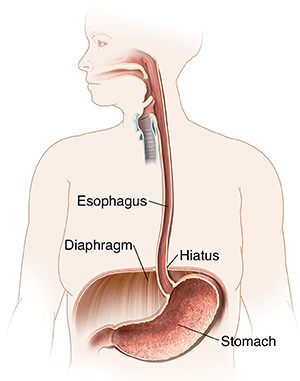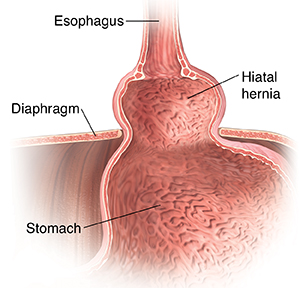What Is a Hiatal Hernia?
A hiatal hernia is when the area where the stomach and esophagus meet bulges up through the diaphragm into the chest cavity. In some cases, part of the stomach may bulge above the diaphragm. Stomach acid may move up into the esophagus and cause symptoms. The symptoms are often blamed on GERD (gastroesophageal reflux disease). You may only know about the hernia when it shows up on an X-ray taken for other reasons.


What you may feel
The hiatus is a normal hole in the diaphragm. The esophagus passes through this hole and leads to the stomach. In some cases, part of the stomach may bulge above the diaphragm. This bulge is called a hernia. Stomach acid may move up into the esophagus and cause symptoms.
When you eat, the muscle at the hiatus relaxes to let food pass into the stomach. It tightens again to keep food and digestive acids in the stomach.
Many people with a hiatal hernia have mild symptoms. You may notice these GERD symptoms:
Treating symptoms
If you have been diagnosed with a hiatal hernia, these tips may help ease symptoms:
-
Lose excess weight. Extra weight puts pressure on the stomach and esophagus.
-
Don’t lie down after eating. Sit up for at least an hour after eating. Lying down after eating can increase symptoms.
-
Don't have certain foods and drinks. These include fatty foods, chocolate, coffee, mint, caffeine, and other foods that cause symptoms for you.
-
Don’t smoke or drink alcohol. These can make symptoms worse.
-
Look at your medicines. Discuss your medicines with your healthcare provider. Many medicines can cause symptoms.
-
Consider an antacid medicine. Ask your healthcare provider about over-the-counter and prescription medicines that may help.
-
Ask about surgery, if needed. Surgery is a treatment choice for some people. Your healthcare provider can help you decide if surgery is right for you.
Online Medical Reviewer:
Marianne Fraser MSN RN
Online Medical Reviewer:
Raymond Turley Jr PA-C
Online Medical Reviewer:
Robyn Zercher FNP
Date Last Reviewed:
9/1/2023
© 2000-2024 The StayWell Company, LLC. All rights reserved. This information is not intended as a substitute for professional medical care. Always follow your healthcare professional's instructions.